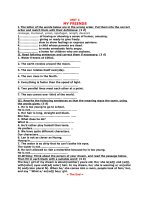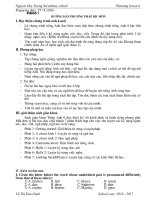BT UNIT 1 TIENG ANH 11 THI DIEM
Bạn đang xem bản rút gọn của tài liệu. Xem và tải ngay bản đầy đủ của tài liệu tại đây (79.28 KB, 3 trang )
UNIT 1
I.
VOCABULARY
1. …………….is a family group with a close relationship among the
members that includes not only parents and children but also
uncles, aunts, grandparents, etc.
2. ……………….is a family that consists of father, mother and
children, when it is thought of as a unit in society.
3. …………………is the care of children, especially while parents are
at work
4. ……………..means all the people who were born at about the
same time.
5. ………………is the difference in attitude or behaviour between
young and older people that causes a lack of understanding
6. …………………..is the behaviour that is considered correct while
you are having a meal at a table with other people.
7. A……………person is the one who prefers traditional styles and
values.
8. “Follow in somebody’s ………….” means to do the same job, have
the same style of life, etc. as somebody else, especially somebody
in your family.
9. …………..is a way of thinking about a subject.
10. ………………..means willing to listen to, think about or accept
different ideas
11. ………………means to introduce a new law, rule, tax, etc.; to order
that a rule, punishment, etc. be used
12. …………is a situation in which people, groups or countries are
involved in a serious disagreement or argument
13. ………….is a strong feeling that something/somebody exists or
is true
14. ………………is the way that somebody/something looks on the
outside
II.
GRAMMAR
E1: Find ONE mistake in each sentence and correct it.
1. You must eats more fruit and vegetables every day.
2.I have to tidied my room before my mother comes back home. She can't
stand a messy house.
3. She should go out late at night because of danger.
4. She have to speak English well because her current job needs it.
5. He musts save up his money so as to buy a new house next year.
6.He oughtn't to find another solution to this problem if he doesn't want to g
et fired
7.They can arrive at the airport at 5 so as not to miss their filght at 6.
8.I have to submit my essay last night. My teacher set the deadline on that
day.
9. You ought to stay up at night, which is not good for your health.
10. We haven't to buy souvenirs for Sally. She doesn't like them.
E2: Complete the sentences using the given words.
mustn't
have to
should ought
shouldn't
have to
ought not
must
1. You …………….. type your essay but if you want, you can do it.
2. I …………….. go home too late. My parents are very strict.
3. She is an expert adviser; thus, I think you …………….. to ask her for
some advice.
4. You …………….. ask your teacher if you don't understand the lesson.
5. I…………….. finish homework before coming to class. My teacher is
rather strict.
6. We …………….. show respect to our parents.
7. I think you …………….. stay up late because it is not good for your
health.
8. If you want to help your friend, you …………….. to do her homework.
Instead, you should show her how to do it by herself.
E3: Choose one of the two bold words which best completes the
sentences.
1. It's cold. You should/shouldn't turn on the fan.
2. You ought not to/ought to do homework before you go out with your
friends.
3. You should/shouldn't eat plenty of fruit or vegetables every day in
order to keep healthy.
4. You must/mustn't eat in the class.
5. You ought to/ought not to drink a lot of water every day.
6. I must/have to submit my homework before 12 o'clock because the
deadline is 12 o'clock.
7. I must/have to stay at home to take care of my children.
8. My friend says: "You don't have to/mustn't drink champagne. You can
have a coke or fruit juice instead.
9. You don't have to/mustn't drink if you're going to drive afterwards.
10. You don't have to/mustn't pick up Tom at the airport because Judy will
pick him up.
E4: Fill in the gaps with “must” and “have to”. Use the negative form
if necessary.
1. Tomorrow is Mai's birthday. I…………………buy a present for her.
2. We might…………………leave earlier than we expected.
3. If you feel better, you…………………take medicine any more.
4. I…………………leave home at 6:00 because I have an appointment at
7:00.
5. You…………………eat a lot before doing the exercise. If you do, you
might get into some trouble with your stomach.
6. We couldn't find a better present so we…………………choose this one.
7. If you are a member of the club, you…………………pay to use these
facilities because they are included in the membership fee.
8. I had the flu, so I…………………stay in the bed for two days.
9. If you are under 18 years old, you…………………ride a motorbike.
10. All students…………………wear uniforms on Mondays.
E5: Rewrite each sentence using the word(s) in the brackets, without
changing its meaning.
1. If I were you, I would spend more time talking with my children. (should)
………………………………………………………………
2. John doesn't get permission to use that computer. (mustn't)
……………………………………………………………
3. It is necessary that people who work here leave by 6 p.m. (must)
……………………………………………………………
4. Every staff isn't allowed to smoke or eat in the office. (mustn't)
……………………………………………………………
5. Customers are advised to check their luggage before leaving the airport.
(ought to)
……………………………………………………………
6. It is forbidden for students to cheat in the exam. (mustn't)
……………………………………………………………
7. Ms. Ly is in charge of cleaning the floor every day. (has to)
……………………………………………………………
8. You are not allowed to take photographs in the museum. (mustn't)
……………………………………………………………
9. It would be a good idea for you to share the housework with your
mother. (ought to)
……………………………………………………………
10. It is not necessary for Jack to call Ben today. (doesn't have to)
………………………………………………………………
III. READING
Family conflict
The generation gap, which refers to a broad difference between one
generation and another, especially between young people and their
parents, usually leads to numerous conflicts. Such family conflicts can
seriously threaten the relationship between parents and children at times.
It goes without saying that, however old their children are, parents still
regard them as small kids and keep in mind that their offspring are too
young to protect themselves cautiously or have wise choices. Therefore,
they tend to make a great attempt to help their children to discover the
outside world. Nevertheless, they forget that as children grow up, they want
to be more independent and develop their own identity by creating their
own opinions, thoughts, styles and values about life.
One common issue that drives conflicts is the clothes of teenagers. While
teens are keen on wearing fashionable clothes which try to catch up with
the youth trends, parents who value traditional clothes believe that those
kinds of attire violate the rules and the norms of the society. It becomes
worse when the expensive brand name clothes teens choose seem to be
beyond the financial capacity of parents.
Another reason contributing to conflicts is the interest in choosing a career
path or education between parents and teenagers. Young people are told
that they have the world at their feetand that dazzling future opportunities
are just waiting for them to seize. However, their parents try to impose their
choices of university or career on them regardless of their children's
preference.
Indeed, conflicts between parents and children are the everlasting family
phenomena. It seems that the best way to solve the matter is open
communication to create mutual trust and understanding.
Choose the best anwers for the following questions.
1. Why do most parents still treat their teenage children like small kids?
A. Because children usually make mistakes
B. Because they think that children are too young to live independently.
C. Because they think that children can't protect themselves well.
2. The word “offspring” in the second paragraph refers to________.
A. parents
B. children
C. mind
3. What do parents usually do to help their children as they are young?
A. They prepare everything for their children.
B. They take care of their children carefully.
C. They encourage their children to explore the outside world.
4. Which kinds of clothes do teenagers want to wear?
A. latest fashionable clothes
B. casual clothes
C. shiny trousers and tight tops
5. According to the passage, what are parents' viewpoints about the
teenagers' clothes?
A. Teenagers' clothes get the latest teen fashion trends.
B. Teenagers' clothes are too short and ripped.
C. Teenagers' clothes are contrary to the accepted standards and values of
the society.
6. Why do teenagers want to choose their university or career?
A. They want to explore the world on their own.
B. They want to decide their future by themselves.
C. Both A and B are correct.
7. The word “seize” in the fourth paragraph is closest in meaning
to________.
A. catch
B. choose
C. find
8. Which can be the best title for the passage?
A. Where do parent-child conflicts come from?
B. How are children different from their parents?
C. How do we bridge the generation gap?









